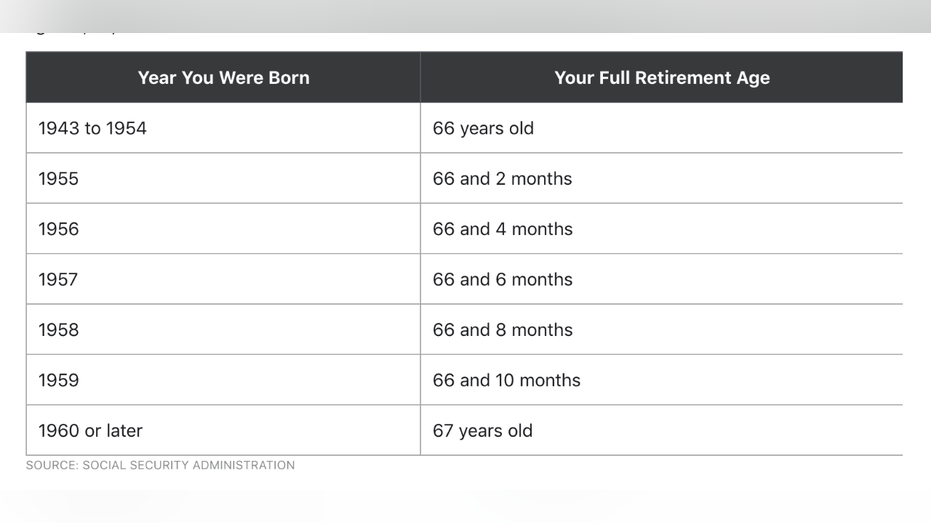Most important Social Security chart you'll ever see
Learn how your full retirement age affects the amount you will receive in benefits
Social Security benefits can potentially make or break your retirement, particularly if your retirement fund isn't as strong as you'd hoped it would be. Close to half of baby boomers have no retirement savings at all, according to a 2019 survey from the Insured Retirement Institute, and the coronavirus pandemic may have affected many workers' retirement plans.
PROPOSED SOCIAL SECURITY EXPANSION WOULD BOOST PAYROLL TAXES
In fact, the average 401(k) balance dropped by nearly 20% in the first quarter of 2020, a study from Fidelity Investments revealed, and the average IRA balance dipped around 14%. That means if you're nearing retirement, Social Security benefits may be more important than ever. And this chart can help ensure you're making the most of your monthly checks.
Better understanding your future benefits
One of the most important factors to understand about Social Security is how your full retirement age (FRA) affects how much you'll receive in benefits. Depending on the year you were born, your FRA is either age 66, 67, or somewhere in between:

Knowing your FRA is crucial because it will affect how much you collect in benefits every month for the rest of your life. To receive the full benefit amount you're entitled to, you'll need to wait until your FRA to begin claiming. By claiming before or after that age, you'll receive smaller or larger checks.
You can begin claiming benefits as early as age 62, but by doing so, your checks will be reduced by up to 30% if you have a FRA of 67 years old. A common misconception is that if you claim early, you'll only receive smaller checks until you reach your FRA, at which point you'll begin collecting your full benefit amount each month. However, your benefit reductions are permanent if you claim early, meaning you'll be receiving smaller checks for the rest of your life.
You can also wait until after you reach your FRA to file for benefits, and doing so will result in bigger monthly checks. If you have an FRA of 66, you can receive your full benefit amount plus an additional 32% by waiting until age 70 to claim. Those with a FRA of 67 can collect an extra 24% by delaying benefits until age 70. Keep in mind, though, that you won't receive any extra money in benefits by waiting past age 70 to claim. So while you can wait longer than that, there's no financial incentive to do so.
CORONAVIRUS FORCING EARLY RETIREMENT? HERE ARE YOUR OPTIONS
What age is best to claim benefits?
The age you should begin claiming benefits will depend on your situation, so the answer will be different for everyone. But there are two factors, in particular, you should consider when determining what age to claim: how much you have in savings, and your life expectancy.
The more you have in savings, the less you'll need to depend on Social Security to make ends meet in retirement. So if you have a robust retirement fund and don't necessarily need the extra cash from your benefits, you may choose to claim early. Your checks will be smaller, but you'll also have a little extra spending money earlier in retirement. If you don't have much in savings, though, you may choose to delay benefits. Those bigger checks can go a long way, especially if your savings run dry a few years into retirement.
HOW CORONAVIRUS COULD DAMAGE SOCIAL SECURITY
Next, try to estimate approximately how long you'll live. When the Social Security Administration calculates benefits, it assumes beneficiaries will be living an average lifespan -- or around 85 years. So in theory, regardless of whether you claim early or delay benefits, you should receive roughly the same amount over a lifetime; you'll either receive smaller checks but more of them, or bigger checks but fewer of them.
However, if you live a shorter- or longer-than-average lifespan, you may be better off claiming before or after your FRA. If you have health problems or other reason to believe you may not live into your mid-80s or beyond, claiming early might mean you'll receive more over a lifetime compared to if you'd delayed benefits. On the other hand, if you are in the best shape of your life and most of your older relatives have lived into their 90s, it might be a good idea to delay benefits.
CLICK HERE TO READ MORE ON FOX BUSINESS
Social Security benefits can have a significant impact on your retirement, so it's wise to understand the program as much as you can. By knowing your FRA and choosing the right age to begin claiming benefits, you can set yourself up for retirement success.
The $16,728 Social Security bonus most retirees completely overlook
If you're like most Americans, you're a few years (or more) behind on your retirement savings. But a handful of little-known "Social Security secrets" could help ensure a boost in your retirement income. For example: one easy trick could pay you as much as $16,728 more... each year! Once you learn how to maximize your Social Security benefits, we think you could retire confidently with the peace of mind we're all after. Simply click here to discover how to learn more about these strategies.




















